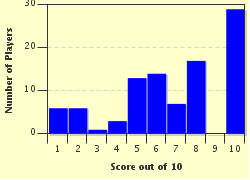Quiz Answer Key and Fun Facts
1. Saddam Hussein is sentenced to death by hanging. November 5,...?
2. Angela Merkel becomes the first female chancellor of Germany. November 22,...?
3. Bhutan holds its first free elections, ending a century of absolute monarchy. March 24,...?
4. Ten new members join the Schengen free travel area in Europe, marking the largest expansion to date. December 1,...?
5. A global alert is issued by the WHO with regard to a respiratory disease concentrated in Asia. March 12,...?
6. As a result of the financial crisis, Iceland's Prime Minister resigns. January 26,...?
7. For the first time in human history, a privately funded reusable craft reaches space. June 21,...?
8. Windows XP is publicly released, officially ending the MS-DOS era. October 25,...?
9. The Rome Statute establishes the International Criminal Court. July 1,...?
10. Kim Dae-jung becomes the first South Korean president to visit North Korea. June 13,...?
Source: Author
WesleyCrusher
This quiz was reviewed by FunTrivia editor
bloomsby before going online.
Any errors found in FunTrivia content are routinely corrected through our feedback system.

